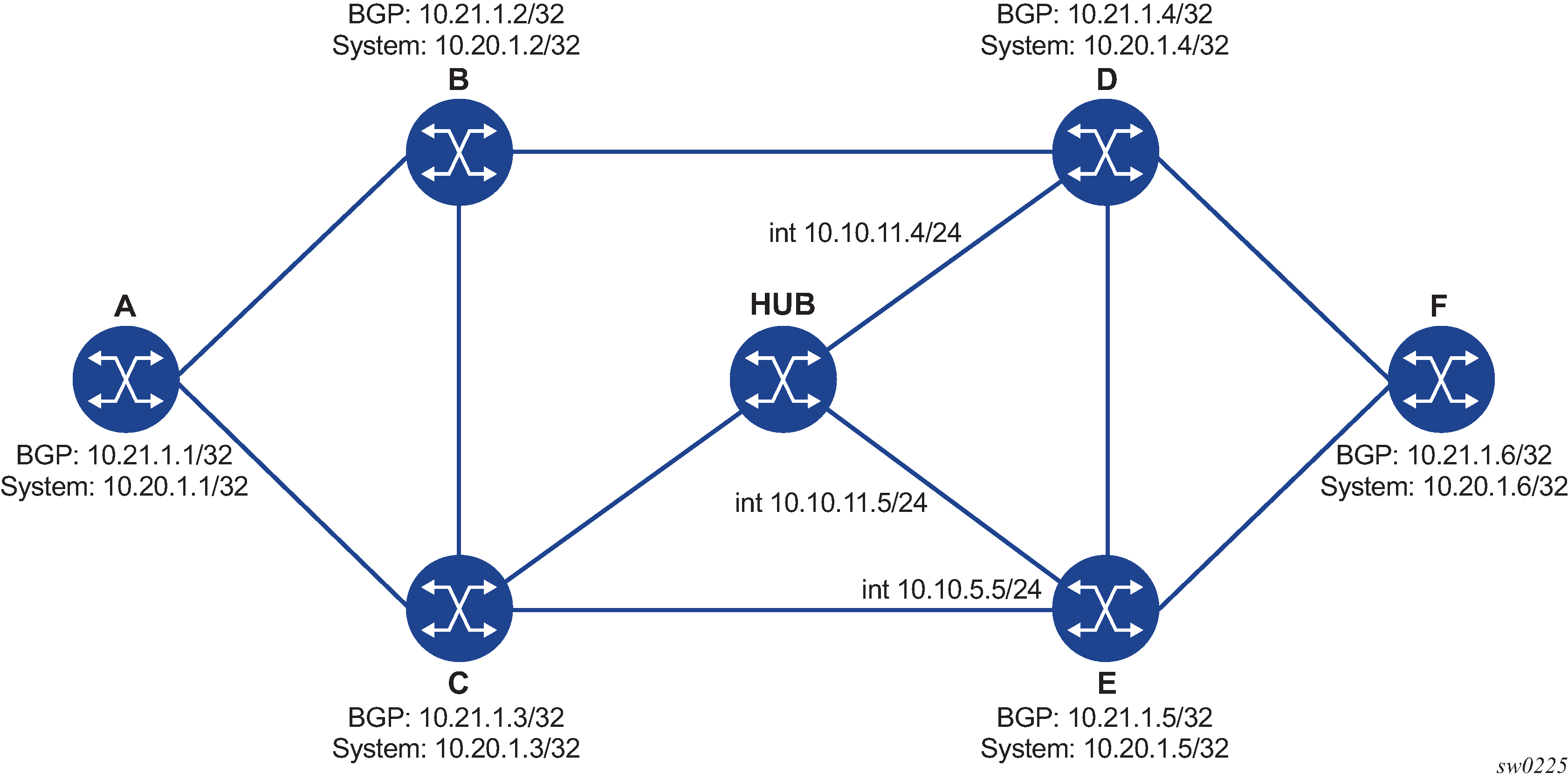When IGP shortcut is enabled in an IS-IS or an OSPF instance and the family SRv4 or SRv6 is set to resolve over RSVP-TE LSPs, a hierarchical tunnel is created whereby an SR-ISIS IPv4 tunnel, an SR-ISIS IPv6 tunnel, or an SR-OSPF tunnel resolves over the IGP IPv4 shortcuts using RSVP-TE LSPs.
The following example outputs are of the lsp-trace command for a hierarchical tunnel consisting of an SR-ISIS IPv4 tunnel and an SR-OSPF IPv4 tunnel, resolving over an IGP IPv4 shortcut using a RSVP-TE LSP.
The topology, as shown in Figure: Example topology for SR-ISIS over RSVP-TE and SR-OSPF over RSVP-TE, is used for the following SR-ISIS over RSVP-TE and SR-OSPF over RSVP-TE example outputs.

SR-ISIS over RSVP-TE example output:
*A:Dut-F# oam lsp-trace sr-isis prefix 10.20.1.1/32 detail path-destination 127.1.1.1 igp-instance 1
lsp-trace to 10.20.1.1/32: 0 hops min, 0 hops max, 180 byte packets
1 10.20.1.4 rtt=5.05ms rc=8(DSRtrMatchLabel) rsc=2
DS 1: ipaddr=10.10.4.2 ifaddr=10.10.4.2 iftype=ipv4Numbered MRU=1500
label[1]=262121 protocol=4(RSVP-TE)
label[2]=28101 protocol=6(ISIS)
2 10.20.1.2 rtt=5.56ms rc=8(DSRtrMatchLabel) rsc=2
DS 1: ipaddr=10.10.1.1 ifaddr=10.10.1.1 iftype=ipv4Numbered MRU=1500
label[1]=262124 protocol=4(RSVP-TE)
label[2]=28101 protocol=6(ISIS)
3 10.20.1.1 rtt=7.30ms rc=3(EgressRtr) rsc=2
3 10.20.1.1 rtt=5.40ms rc=3(EgressRtr) rsc=1
*A:Dut-F#
SR-OSPF over RSVP-TE example output:
*A:Dut-F# oam lsp-trace sr-ospf prefix 10.20.1.1/32 detail path-destination 127.1.1.1 igp-instance 2
lsp-trace to 10.20.1.1/32: 0 hops min, 0 hops max, 180 byte packets
1 10.20.1.4 rtt=3.24ms rc=8(DSRtrMatchLabel) rsc=2
DS 1: ipaddr=10.10.4.2 ifaddr=10.10.4.2 iftype=ipv4Numbered MRU=1500
label[1]=262125 protocol=4(RSVP-TE)
label[2]=27101 protocol=5(OSPF)
2 10.20.1.2 rtt=5.77ms rc=8(DSRtrMatchLabel) rsc=2
DS 1: ipaddr=10.10.1.1 ifaddr=10.10.1.1 iftype=ipv4Numbered MRU=1500
label[1]=262124 protocol=4(RSVP-TE)
label[2]=27101 protocol=5(OSPF)
3 10.20.1.1 rtt=7.19ms rc=3(EgressRtr) rsc=2
3 10.20.1.1 rtt=8.41ms rc=3(EgressRtr) rsc=1